The merry Christmas we know today in America is not what Black people knew during slavery in the early 1800s. Only some slaves were able to have somewhat of a break from the brutality they lived day in and day out.
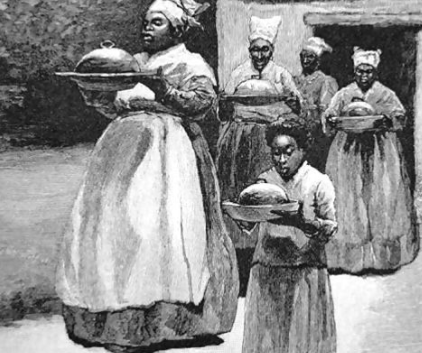
In the 1830s, the slaveholding states Alabama, Louisiana and Arkansas were the first in the United States to make Christmas a state holiday. During this time is when giving gifts, singing Christmas carols, and extravagant decorations took place in white American culture. The slaves that actually got a break, would usually only last a couple of days. Did you know that in some parts of the country, slaves were given a yule log to burn in the “big house” and as long as the log burned, they were granted rest during the holiday? If they were lucky and burned the log right, it would last up until the new year. Some slaves were able to see their families on other plantations, get married, receive gifts from their “master”, and eat special food.
Unfortunately, slaves that worked in the house would work the hardest during Christmas, tending to parties and guests. So, while Christmas seemed like a break, plantation workers were too busy trying to get as much rest as they could and house workers would work double time. Despite what white America was doing, our ancestors participated in rituals such as “Christmas gift” and “JonKonnu”. Christmas gift involved them asking any white person for a Christmas gift as long as they did not address them first. In Jonkonnu, slave men would dress up in masks and costumes, masquerading around town going from house to house playing music and dancing while collecting small gifts.
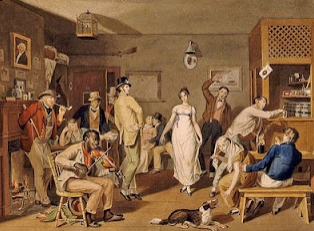
The only gifts really given by slave owners were clothes and food. I can’t imagine how cold these slaves must’ve been during the winter seasons with barely any clothes or blankets to keep them warm while they worked or slept.
“In every slave-holding state, many slaves suffer extremely, both while they labor and while they sleep, for want of clothing to keep them warm.” –Rev. John Rankin, of Ripley, Ohio, a native of Tennessee.
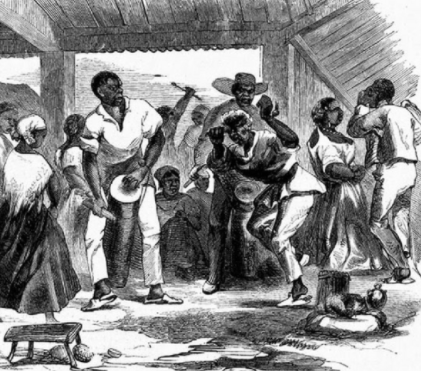
While white Americans continued to have a good time, and probably thought their slaves were grateful, really they wanted their freedom to be able to do the same. Some slaves decided to sit and deal with the everyday pain, while others plotted their escape. Most slave owners were distracted with family, so it was the perfect escape. Resistance came in a lot of different ways. Some slaves practiced their own religious and cultural independence refusing to deal with the white holiday and others plotted their escape.
According to Robert E. May, a professor of history at Purdue University and author of Yuletide in Dixie: Slavery, Christmas and Southern Memory, owners’ fears of rebellion during the season sometimes led to pre-emptive shows of harsh discipline. This brings me to New Years Day otherwise known to slaves as “Heartbreak day.” January 1 to many slaves meant they would have to wait anxiously to see if they would be rented out to another family, separating them from their families.
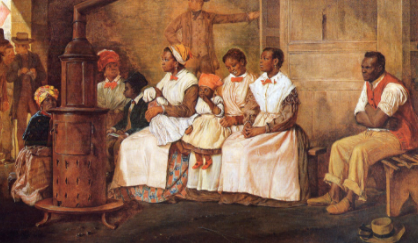
According to Frederick Douglass, who himself was born a slave, Christmas was just another oppressive tool used by slave owners to reinforce their control over the slaves and break up solidarity, ease the burden of familial separation, and exert control. Just another tool to control slaves by appealing to the psychological need to reunite with their families.
Slave owners sometimes forced enslaved workers to get drunk or wrestle with each other on Christmas just to entertain their family. There is a popular story about a man who was whipped so bad two months before Christmas in 1862 that the scars on his back left the most horrible welts anyone had ever seen. His name was ,Gordon and he had escaped his slave owner in Mississippi by rubbing himself with onion so the blood hounds could not track him down.
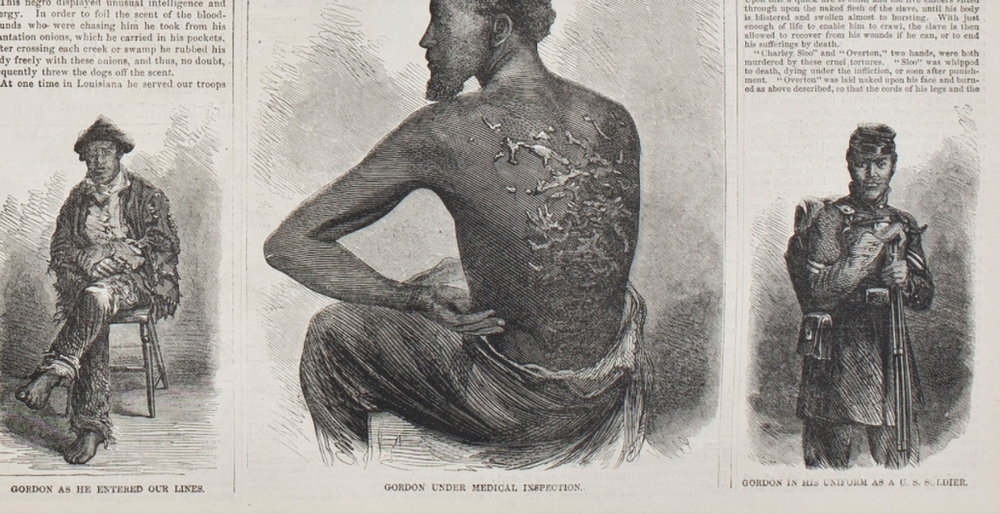
Running away during the holidays, was actually a brilliant idea when you think about it. Since slaves weren’t expected to show up for work until after the holiday, slave owners likely wouldn’t be looking for them. Also, the slave owners were used to seeing Black people on the streets during the holiday season, so no one would be questioning if a slave was a runaway. This time also resulted in a lot of slave revolts. One third of both documented and rumored slave rebellions reportedly occurred around Christmas.
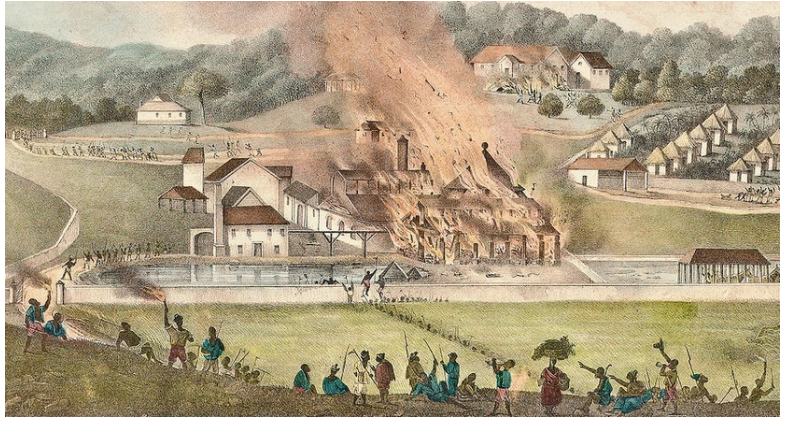
“This time we regarded as our own, by the grace of our masters; and we therefore used or abused it nearly as we pleased. Those of us who had families at a distance, were generally allowed to spend the whole six days in their society.”– Frederick Douglass
There is a book written by a slave couple called “Running a Thousand Miles for Freedom;
or, the Escape of William and Ellen Craft from Slavery,” about how they made their way to Philadelphia on Christmas day. Ellen Craft was the light-skinned daughter of a slave and her white slave owner. She dressed up as a man and passed for her husband’s master. Harriet Tubman also used Christmas to get her three brothers out of slavery during the Underground Railroad.
The Christmas season also gave way to the largest slave rebellion in the history of the British Caribbean known as the Christmas Rebellion (or the Baptist War). Almost 60,000 slaves (about 20% of the enslaved population of 300,000) led by the Black Baptist preacher Samuel Sharpe, went on strike and rebelled against plantation owners, demanding freedom and higher wages. The first revolt on Christmas day was the 1521 Hispaniola Revolt. A group of 20 Wolof captives, who were claimed by Christopher Columbus’s sons, revolted against their overlords. They had waited especially until Christmas Day, when the Spaniards were celebrating and probably drunk and not paying attention. A lot of Spanish colonists were killed and buildings were burned down. Maybe our ancestors were showing the recent slaves how it is done.
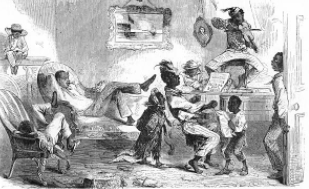
Slaves remember these times vividly. They remembered how they used it to mark time around the planting season. They knew they could count on it for a measure of freedom and relaxation; adults remembering gifts and how some slave owners came and joined the slaves and sang, dance, and did in their own holiday traditions. This is when some slave owners would invite slaves to the house to gift or join them in the slave quarters with gifts. Some records indicated that some Christmas celebrations lasted all night from Christmas Eve through Christmas Day. Slaves would play music with any instrument they could find, like homemade drums, fiddles, and banjos.
All in all, the slaves had to deal with a lot of psychological abuse during this time, even if they received gifts or time off. Human ownership is barbaric and would trouble any person psychologically. Some slave owners used the joy “some” slaves experienced during this time to justify the institution of slavery, while others would talk down to the slaves about drinking alcoholic beverages and use that as a reason to affirm why they were slave owners. Those slaves that didn’t want anything to do with Christmas were looked at as troublemakers and treated as such. These slave owners actually believed that this one time off from human slavery, was enough relief from the year round brutality they went through.
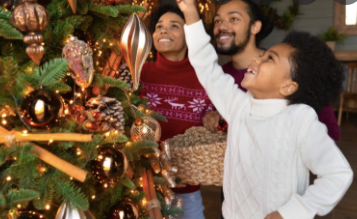
Still today, Black people remember their ancestors and what Christmas time meant for them and how far we have come to be able to enjoy this Holiday. Religious Black Christians celebrate Christ’s day of birth. We have embraced our own cultural rituals during Christmas, now including ,Kwanzaa, derived from the word “first” in Swahili, which is inspired by the start of the harvest season in Africa. It is a week long celebration of our culture and heritage taking place every year from December 26 to January 1 observed by millions of people not only in the United States but around the world.
During the week, families gather to give gifts, eat, and light candles in honor of their ancestors and their hopes for the future. As future generations continue ahead of us, growing and breathing new life into our culture with new rituals, we may just leave Christmas as a pagan holiday all together. But until then, we will enjoy our family, friends, food, gifts, etc each year for Christmas day in honor of triumphs, religious beliefs and our ancestors who were enslaved!



